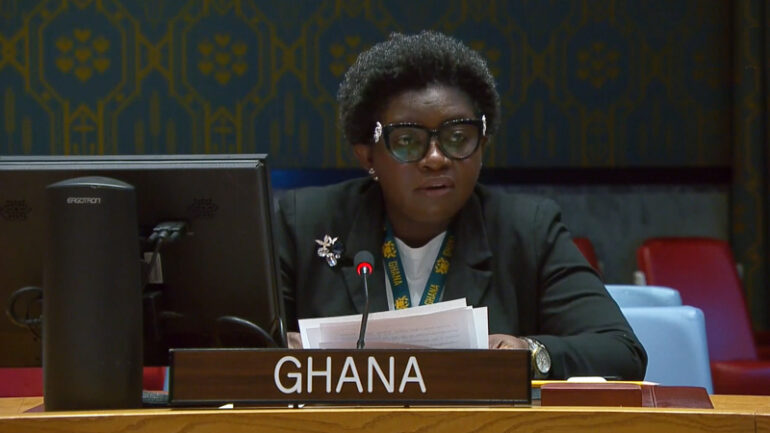UNSC briefing on Threats to international peace and security

UNITED NATIONS SECURITY COUNCIL BRIEFING ON THREATS TO INTERNATIONAL PEACE AND SECURITY
Mr. President,
I would like to thank the three (3) briefers for obliging the Council with their views on the agenda item. We particularly thank them for the manner by which their unique perspectives have demonstrated that given the same set of facts, the interpretation that different people may have on those same facts could differ. We therefore urge all members of this Council to remain focused on the effort to resolve the aggression against Ukraine and address the concerns of the people of Ukraine, who today continue to suffer a war that they did not seek, and a war that they cannot cease to fight. While we do not underrate the potential for the perceived concerns of “Russophobia” to be an underlying driver for the actions of some parties in the war against Ukraine, our assessments do not lead us to conclude that there is systematic and widespread State action against ethnic Russian speaking citizens of Ukraine or that there are a set of issues that could collectively be characterized as “Russophobia and which constitutes a threat to international peace and security.
Indeed, in reviewing the chronology of events since the annexation of Crimea in 2014, the conflict in the Dombas
region of the same year, and the launch of a full-scale aggression against Ukraine in February last year, we have
struggled to identify a consistent raison d’etre that could be a basis for justifying all these actions that have violated the sovereignty and territorial integrity of Ukraine and sought to undermine the Charter of the United Nations.
Rather, when we have peeled off the veneer of rolling arguments that have been made to justify such actions, we
have come to the reasonable conclusion that what truly lay beneath, has been an attempt by a bigger neighbor to assert, through brute force and subterfuge, dominance over its smaller neighbor. As we have said in the past, that course of action cannot be an acceptable way for pursuing international relations and our condemnation of such actions is the same whether it occurs in the East or in the West.
Indeed, for Ghana, we stand strongly against the violations of the rights and freedoms of all people and are firmly of the view that international mechanisms such as the Human Rights Council, the Council of Europe, the International Court of Justice and the International Criminal Court provide appropriate channels for redressing violations of the rights of any group of people. The recourse to such mandated bodies is important because it helps to stabilize our international system and it ensures accountability on the part of perpetrators and justice for affected individuals.
As we all know, and have pledged to observe, the operation of the international law principles of sovereignty and non interference restrain any State from arrogating unto itself the right to interfere in the internal affairs of another State.
We believe that the Russian Federation’s choice of force against Ukraine, excessively outweighs any threats it perceives as arising from ethnic-related attacks against Russian speaking people, who by the way are citizens of Ukraine. Indeed, if this argumentation were to be stretched, we can reasonably conceive that across most parts of the world, there could be potential for further wars. That, in our view, cannot be the world we desire and that cannot be the world that would be helpful for the people whose interest we profess to seek. As we have asserted in previous meetings of the Council there is no justification for the aggression against the sovereignty, political independence and territorial integrity of Ukraine.
Mr. President,
We continue to be concerned by the on-going war, which is taking place in the context of widespread human rights
violations committed against civilians and military personnel. Growing evidence suggest gross violations, which, in some instances, may constitute war crimes. The targeted missile strikes against civilian populated areas, trafficking of persons, torture, enforced disappearances conflict-related sexual violence among other forms of violations which have occurred over the past 13 months, are grave and stand in sharp contrast to our common purpose to promote and protect human rights and freedoms of people everywhere. We remain gravely concerned by the course of the war
and the heightened hostilities which put us farther away from the shared aspiration for peace in Ukraine. While reiterating our call for the immediate cessation of hostilities and the unconditional withdrawal of the Russian troops, we underscore the principles of human rights laws and international humanitarian law and the obligations of the
warring parties to fully adhere to them.
Mr. President,
We reaffirm our support for on-going investigations and processes that would eventually lead to the identification of
perpetrators of all violations to hold them to account for their actions or inactions. The world cannot afford impunity in the face of such egregious violations in Ukraine. We continue to urge the Council and the international
community to redouble efforts in helping the parties to resolve the conflict through the channels of diplomacy and dialogue. We also re-affirm our support for the position that a just, peaceful and comprehensive peace in Ukraine must be founded on the principles of international law and the purposes and principles of the Charter of the United Nations.
More than any other factor, it is the continuing aggression and hostilities that complicate and obliterate the
prospects for a timely solution to the war in Ukraine. We, therefore, urge the Russian Federation to re-consider its
military approach to the conflict and to remain open to finding a solution through dialogue and negotiations.
I thank you for your kind attention.
